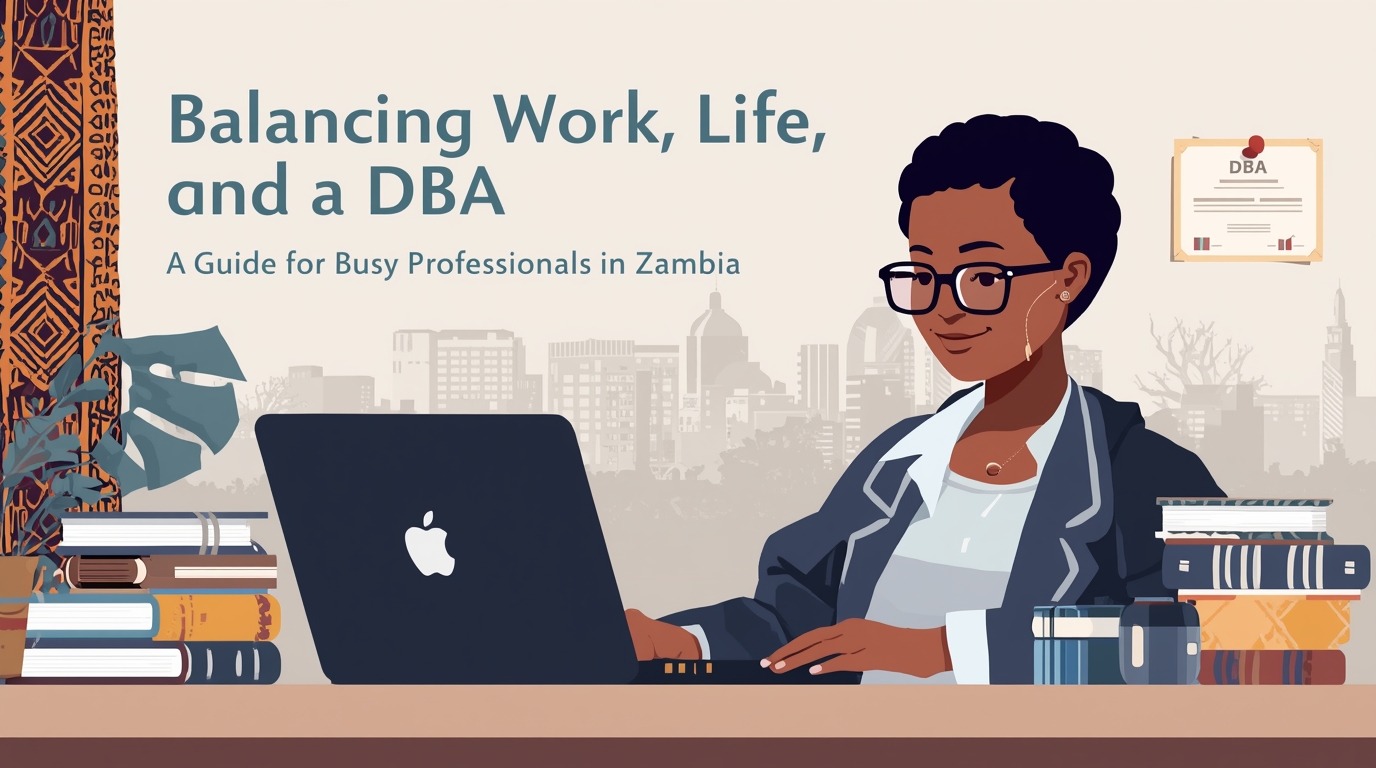In Zambia’s dynamic and rapidly transforming economy, the drive for professional advancement is palpable. From the bustling commercial hubs of Lusaka and the Copperbelt to the burgeoning opportunities in agriculture, tourism, and ICT, leaders are in high demand. You, the ambitious Zambian professional, are at the heart of this transformation. You’re managing teams, driving growth, and navigating a complex economic landscape. You see the next step—the C-suite, a thought leadership role, or perhaps even a major entrepreneurial venture—and you know that a terminal degree, a Doctor of Business Administration (DBA), is the key to unlocking that future.
But then, reality hits. Your days are not 9-to-5. They are filled with back-to-back meetings, strategic planning sessions, client dinners, and the constant demands of a high-stakes career. You’re navigating the long-hour work culture that is common in sectors like banking and mining. You’re also a parent, a spouse, a friend, and a community member. The idea of adding a rigorous doctoral program to this already overflowing plate seems less like a dream and more like a recipe for burnout.
This is the professional’s dilemma. How do you pursue the pinnacle of business education without sacrificing your career momentum or your personal well-being?
The answer lies not in finding more hours in the day, but in finding a program designed for the reality you live in. This guide is for you—the busy Zambian professional who refuses to believe that “growth” and “balance” are mutually exclusive.
The Zambian Context: Why a DBA, and Why Now?
Zambia is at an exciting crossroads. The nation’s “Vision 2030” and the Eighth National Development Plan (8NDP) are not just policy documents; they are a clear call for a new generation of leaders. The economy is actively diversifying beyond its traditional mining stronghold into energy, manufacturing, technology, and sustainable agriculture. This is not a simple shift; it’s a strategic transformation that requires leaders who can think beyond quarterly reports and manage complex, systemic change.
This is precisely where a DBA differentiates itself. Unlike a traditional PhD focused purely on academic theory, a DBA is a professional doctorate designed to create “scholar-practitioners.” It equips you with the advanced research skills to diagnose and solve real-world, high-level business problems.
Imagine yourself:
- In the mining sector: Using your doctoral research to develop a groundbreaking framework for sustainable operations and community engagement that attracts international investment.
- In finance: Leading your bank’s digital transformation strategy, armed with data-driven insights on financial inclusion and fintech adoption in Southern Africa.
- In the public sector: Crafting economic policy that effectively leverages public-private partnerships for large-scale infrastructure projects like the Lobito Development Corridor.
- As an entrepreneur: Building a scalable agribusiness that uses innovative technology to meet both local food security needs and export demands.
This is the power of a DBA. It elevates you from a high-level manager to a strategic architect—the exact kind of leader Zambia needs to drive its ambitious agenda.
The “Balance” Myth: Deconstructing the Problem
For most professionals, the primary barrier to a DBA is time. The traditional university model, built around rigid class schedules and on-campus residency, was simply not designed for a director-level professional with board meetings in Solwezi and family commitments in Lusaka.
The high-stress, high-workload environment common in Zambia’s key industries is a significant challenge. An ILO report has highlighted work-related stress as a major issue, often stemming from a lack of control over one’s schedule and immense pressure to perform. The last thing you need is an educational program that adds to this stress.
This is where the paradigm must shift. The problem isn’t your ambition or your work ethic; it’s the inflexible model of old-world education. The solution is not to compromise on the quality of the degree but to demand a modern, flexible delivery system that respects your professional and personal life.
The Solution: The Flexible, Respected DBA
This is where a program like the Doctor of Business Administration in Strategic Leadership from American Imperial University (AIU) changes the game. It is built from the ground up with the global, busy professional in mind, offering a clear path to achieving your doctoral ambitions without derailing your life.
This model is built on three pillars:
1. True Flexibility: Your Doctorate, Your Schedule
A modern DBA program understands that your “study time” might be a flight to Johannesburg, a quiet Sunday morning, or late at night after the children are asleep.
- 100% Online Learning: AIU’s model provides complete “navigational independence.” You are not bound by class times. The campus is wherever your laptop is. This asynchronous model allows you to integrate learning into the natural pauses of your professional life, rather than forcing your life to revolve around a rigid academic calendar.
- Self-Paced Progression: While the program has a 36-month structure, it also offers fast-track options. This flexibility is crucial. You can accelerate your progress during a lighter work period or ease back when a major project demands your full attention. You remain in control, effectively eliminating the schedule-based stress of traditional programs.
2. Robust Support: Independence Does Not Mean Isolation
Many professionals fear that online learning means being left alone with a stack of textbooks. This couldn’t be further from the truth. A premier program replaces the physical classroom with a more potent, personalized support system.
- Expert Faculty Support: At AIU, you have access to expert faculty at the click of a button. These are not just academics; they are seasoned industry leaders who understand the practical challenges you face.
- Mentorship & Community: You are connected with a “Research Buddy” and a global cohort of peers. Imagine discussing strategic challenges with a fellow executive in Singapore, a tech leader in Nairobi, or a finance director in Dubai. Your network doesn’t just stay local; it becomes truly international, a significant asset in Zambia’s globally-connected economy.
3. Relevant Curriculum: From Theory to Impact
A DBA in Strategic Leadership is the perfect fit for Zambia’s current economic climate. The curriculum is designed to help you master the high-level skills needed to lead transformation. You will not just be learning theory; you will be applying it directly to a problem or opportunity within your own organization or industry.
Your dissertation becomes a high-level consulting project that can create tangible value for your company and establish you as a leading expert in your field. This practical application means your studies have an immediate ROI, reinforcing your value at work rather than taking time away from it.
A Practical Guide: Making It Work in Zambia
So, how do you practically integrate this into your life?
- Reframe Your Time: Stop looking for “free days.” Instead, identify “study pockets.” This could be your 30-minute lunch break, the 45 minutes you spend commuting (if you’re not driving), or the hour after dinner.
- Create a Dedicated Space: Whether it’s a home office or a specific quiet corner, create a physical space that signals to your brain—and your family—that you are in “deep work” mode.
- Communicate Your “Why”: Explain your goals to your employer, your family, and your team. A DBA isn’t a hobby; it’s a strategic career move. The right employer will see it as an investment in their own leadership pipeline. Your family will be more supportive when they understand the long-term vision.
- Leverage Your Work: Choose a dissertation topic that aligns with your company’s strategic goals. This turns your “school work” into “career work,” allowing you to leverage company resources and time for research that benefits everyone.
Your Path to the “Dr.” Title Starts Here
For the busy Zambian professional, the choice is clear. The barriers of time and distance have been dismantled by modern educational models. You no longer have to choose between your career, your family, and your ultimate professional goal.
A flexible, online DBA program like the one from American Imperial University offers a clear, manageable, and highly-respected path to the pinnacle of business education. It empowers you to balance the demanding realities of your current role with your ambition for the future.
The question is no longer “if” you can balance it all. The question is, “when will you start?”
Frequently Asked Questions
I already have a very demanding job in Zambia. How much time will this DBA really take, and how is the flexibility different?
The Doctor of Business Administration (DBA) from American Imperial University is designed specifically for busy executives. Unlike traditional programs with rigid schedules, this program is 100% online and asynchronous, meaning you are never required to be online at a specific time. You can fit your studies into “pockets” of time that work for you—whether that’s on a weekend, late at night, or even during a business flight. The program is structured for 36 months but offers fast-track options, giving you control to accelerate or ease back based on your professional demands.
I already have an MBA. How does a DBA in Strategic Leadership provide a different value, especially in the Zambian context?
An MBA teaches you to be an effective manager and master existing business functions. A DBA transforms you into a “scholar-practitioner” and a strategic architect. You will learn advanced research skills to solve complex, high-level problems facing your organization or industry. For Zambia’s diversifying economy, this means you’ll be equipped to not just manage growth but to lead it—whether by developing new sustainable mining frameworks, crafting data-driven fintech strategies, or designing large-scale infrastructure policies.
Will I be studying all alone? “Online learning” can feel isolating.
This is a common concern, and the AIU model is built to prevent it. While you have “navigational independence,” you are not isolated. The program provides a robust support system, including direct access to expert faculty and mentors. You will also be connected with a “Research Buddy” and a global cohort of senior-level peers, allowing you to network and collaborate with executives from around the world, not just in Zambia.
The dissertation seems like the most difficult part. How can I balance that with a full-time career?
The AIU-modelled DBA encourages you to align your dissertation with your professional role. You are encouraged to select a research topic that addresses a real-world challenge or opportunity within your own company or industry. This approach turns your dissertation from a purely academic exercise into a practical, high-value consulting project that can have an immediate impact on your work, making the research process more relevant and manageable.
How does a DBA in Strategic Leadership specifically help me in Zambia’s economy?
Zambia’s “Vision 2030” and economic diversification into new sectors like ICT, energy, and sustainable agriculture require leaders who can think systemically and lead complex change. A focus on Strategic Leadership directly equips you with these skills. You will learn to diagnose organizational challenges, anticipate future market trends, and implement large-scale transformations—making you a prime candidate to lead C-suite initiatives, public-private partnerships, and major new ventures in Zambia’s most critical industries.




